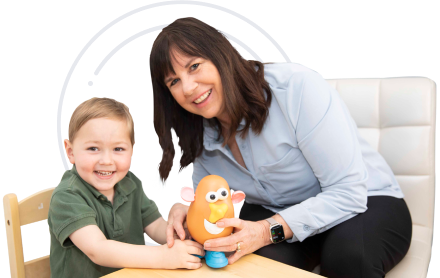The Role of Functional Nutrition and Medicine in Autism

Want to Learn how to Increase Talking & Decrease Tantrums in Children with Autism or Toddlers Showing Signs?
Want to start making a difference for your child or clients?

Functional nutrition and medicine is a branch of medicine that addresses the system as a whole. Denise Voight’s “fall” into autism began when she was looking for ways that she could help her son with his ADHD diagnosis. She wanted to treat her son’s whole body and not simply his hyperactivity. With a Masters in Human Nutrition and Functional Medicine, Denise helps clients address all of the interconnected problems that arise from biochemical imbalances, hormone issues, neurotransmitter disruptors, and gut problems in order to improve symptoms, issues, and behaviors.
While you consider whether to turn to functional nutrition, you should consider what the biggest levers you can pull to help your child out the most. Functional nutrition may be a small lever for you, or it may make a huge difference. If you are dealing with potty training issues or weaning, now may not be the time to explore this option.
Denise shares some of the many ways that zinc deficiencies can show up in a child’s body, and why it’s important to do more than just take some zinc supplements. Copper levels in a body can be impacted by adjusting the zinc levels too little or too much, so fine-tuning mineral deficiencies will take some time and careful consideration.
There are some fears that many people have about changing a child’s diet. It can be difficult or traumatic to suddenly switch to a new diet, and sometimes, a new diet won’t be effective at all. Denise’s practical down-to-earth advice for parents takes into consideration the picky eating habits that many children with autism have.
If you’re ready to explore how functional nutrition can help you or your child, Denise works with adults and children in both one-on-one coaching and in courses. You can connect with her on her website.
Disclaimer:
From time to time, BBC Materials may discuss topics related to health and medicine. This information is not advice and should not be treated as medical advice. The medical information provided in the BBC Materials is provided “as is” without any representations or warranties, express or implied.
You must not rely on the information in the BBC Materials as an alternative to advice from your medical professional or healthcare provider. You should never delay seeking medical advice, disregard medical advice, or discontinue medical treatment for yourself or an individual in your care as a result of any information provided in the BBC Materials. All medical information in the BBC Materials is for informational purposes only.
View our full terms here: https://marybarbera.com/terms-2/
Today’s Guest
Denise Voight, MS is a Clinical Nutritionist with a Masters of Science in Human Nutrition and Functional Medicine specializing in Nutritional Intervention for autism spectrum disorders and ADHD. She is an expert in applying scientifically proven food and nutrition therapies to improve health, learning, and behavior in children with ASD and ADHD.
Denise’s passion for studying nutritional biochemistry for the past 20 years emerged from her own son’s struggle with ADHD. Using a functional medicine approach to heal his gut and identify food intolerances changed their lives and drove Denise to pursue her career as a Functional Medicine Nutritionist where she uses her expertise and compassion to help educate, empower, and support families affected by autism and ADHD. She has spent over 2 decades researching and implementing the latest in nutritional intervention so she can lead people on their journey to optimum health.
You’ll Learn
- Common mineral deficiencies in children autism and ADHD.
- How a zinc deficiency can impact a child’s behavior and appetite.
- Creative ideas for overhauling a permanent diet change for your child.
- How to know when it’s time to address nutrition.
Resources
- #071: Dr. Missy Olive: Medical Conditions Associated with Autism
- #028: Autism & Medication with Dr. Michael Murray, Psychiatrist
- Is Autism Medication an Option for Treatment?
- Ruling Out Medical Issues in Children with Autism….Easier Said than Done!
- The Best Method for Parents to Take Data 24/7
- Teaching Children with Autism to Indicate When They Are in Pain
- Pica and Autism: Mouthing of Things in Children
- How to Overcome Picky Eating for Children with Autism
- Denise Voight’s Website
- MaryBarbera.com/workshops (Sign up for a free workshop online for parents and professionals)
Want to Learn how to Increase Talking & Decrease Tantrums in Children with Autism or Toddlers Showing Signs?
Want to start making a difference for your child or clients?
